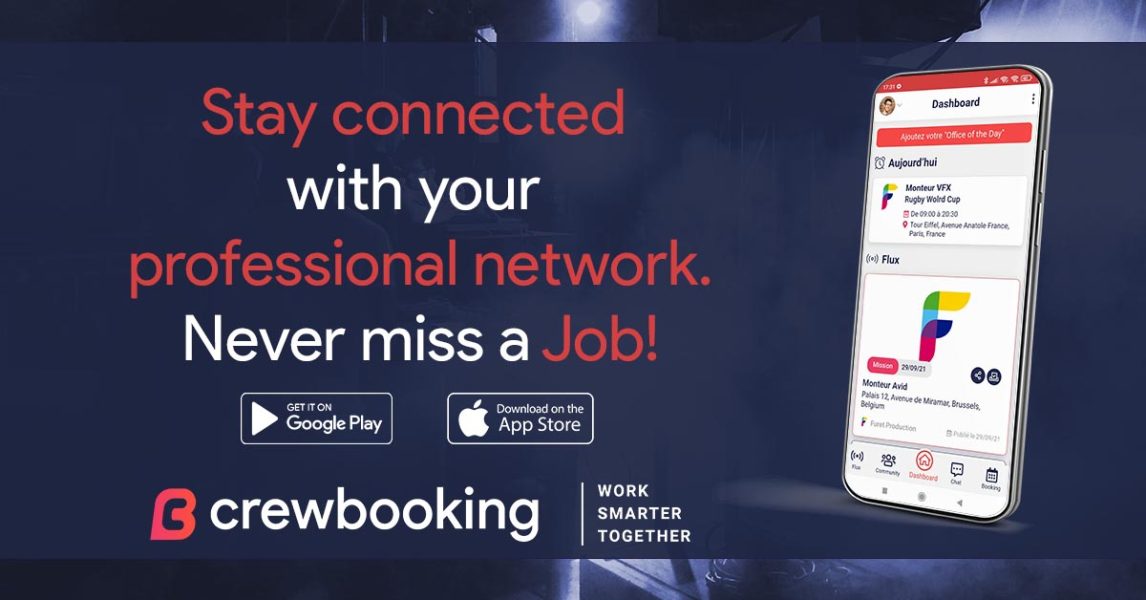There is no doubt that ‘word of mouth’ is still held in very high regard within the live events industry when it comes to recruiting crew members for a project. That being said, like many industries, there has been a shift in the use of online platforms such as LinkedIn and Facebook helping connect crew and freelancers with prospective employers. As we move into 2022 with the ever-growing concern of the lack of crew following the pandemic, there have been a number of platforms, bespoke to the industries needs, offering new methods for freelancers to find work. One of the latest is Crewbooking.
Created by several industry professionals, this online platform has already gained a large user base across the globe. As well as individual freelancers, a large number of companies have also adopted the platform to find and hire crew.
Crewbooking reports an average of 100 to 200 new profiles every day. Company founder, Laurent Hirtz, who has a background in video within the entertainment industry, working with the likes of PRG in the past, came up with the concept of an app for other technicians to check his availability for the show.
This idea soon became the bedrock of what Crewbooking is today; an interactive tool to connect like-minded professionals and, most importantly, help them get work.
“We wanted to provide a full service for the entertainment industry,” explained Crewbooking’s Louis Van De Leest. “From live events to the TV and film sector right the way through to the VFX industry. We are targeting niche industries with the goal of reuniting people under one platform.”
He went on to explain why this platform was vital despite pre-existing services. “We didn’t ever want this to be like other apps on the market. Crewbooking has been built from the bottom up from within the industry and has been developed with industry professionals focussing on this niche sector.”
Accessible via the app or desktop, a profile can be set up as either an individual ‘Crew’ account or as a company. With a Crew account you are able to create a profile stating your expertise, any qualifications you have as well as post about current projects you have been involved in tagging the relevant companies.
With a Crew profile you can also create your own network of other freelancers and even search for others in your region.
Using a company profile, there are a number of features with advanced search options, allowing you to curate a network of known freelancers. With ‘My Team’, end users can build a team on the platform and integrate Crewbooking into the planning of their project.
“One of the things that really separates Crewbooking from other platforms is the search function we offer,” explained Streel. “You can be really specific about the type of freelancer you are after. You define the necessary skills you are after for a specific job and even search geographically for those freelancers in your area.”
Streel highlighted that you can offer crew members a job over the app leading to a quicker response while crewing a show. “You can also keep jobs private to keep them hidden from competitors,” he added.
Within the platform all potential jobs are referred to as ‘missions’. “So far we’ve found with all missions two in 10 of those that are eligible are applying,” enthused Streel. “We found the process is extremely fast as people get notifications on the phone about potential jobs and on the spot can say yes or no. Gone are the days where you needed to call up Crews or send an email and wait for a reply.”
One unavoidable question when it comes to any online platform is that of cost and how this business model is sustainable. “For Crews, the platform is free and will remain so,” explained Streel. “The subscription model is only on the company side.” A medium package cost €75 per month with the large package costing €125 each month. The subscription model itself is not sustainable enough on it’s own if we want Crewbooking to grow as a community,” continued Streel.
“With this in mind we have begun working with a third party payroll company who are paying us to process the contracts that are filled through Crewbooking.”
This process has already begun in Belgium and Italy, where there has been a significant signup on the platform. “This is our vision for Crewbooking’s future,” he said. “If we want to continue in developing new features this is the best solution.”
As we move into the new year, the duo from Crewbooking discussed some of their hopes for the not too distant future. “As of the end of 2021, Crewbooking is available in six different languages,” stated Streel. “This allows a greater opportunity to have more success in various countries rather than forcing users to speak in English.”
In the next 12 months, Crewbooking is bringing on board ambassadors from various regions to increase the reach of the platform. “The hope for these ambassadors is to engage with schools and training centres to promote the platform to the next generation,” stated Streel, a point which Van De Leest was keen to highlight in closing. “23% of people have left the industry which will eventually result in a bottleneck. This industry is going to need some solutions and we believe Crewbooking is one of them.”
This article originally appeared in issue #267 of TPi, which you can read here.


